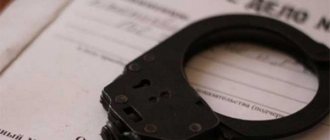Every year, the level of child crime increases, and not only in our country - throughout the world. Often, when examining the personality of an adult defendant, the court finds out that even as a teenager, this person was already registered with law enforcement agencies as a violator.
At the same time, it is believed that the “police children’s room,” as the specialized department for working with children was previously called, prevents the growth of child crime. Is it really? When can minor children be registered with the PDN and how can they appeal against police actions if such actions are clearly unfounded? Read in this article.
What is it and what is the name of the children's police room today?
With the development of juvenile justice in the late 19th and early 20th centuries, attitudes towards crimes committed by minors changed.
If in the Middle Ages and later, crimes of children were punished on an equal basis with adults , with all cruelty and inevitability, then with progress in human culture and the development of society, it was decided to reconsider responsibility for juvenile crime.
In order not to give up on a person because of his dysfunctional family or offenses committed out of stupidity and ignorance, the main attention was paid to supervision and crime prevention, creating special departments for this.
The Commissariat for Juvenile Affairs was founded in the winter of 1918, and the police room we know appeared in Soviet times , in the early 1930s. They were based in rural and urban police departments.
The primary goal of the service is control over orphans, street children, and the prevention of juvenile crime.
Today, the functions of the abolished DKM are divided into two departments :
- juvenile division;
- commission for the same purpose.
Changes occurred during the reform of the Ministry of Internal Affairs of the Russian Federation for the period from 2011 to 2012.
Saving love
Unfortunately, no one is immune from unfavorable circumstances, and parents of teenagers simply need to know such contacts as the address and telephone number of the PDN department. Just as many years ago there was a phone number for the children's police room, now every city and district has its own contact for the PDN service, which can be found out by contacting the nearby police department.
But prevention is still better than correction. To prevent your child from getting into an unpleasant situation, try to communicate with him more, take an interest in his life and surroundings. Ask yourself the question more often: what is my child doing now, where is he and who is he with? This does not mean taking the child’s life under strict control, but the main preventive measure will be parental love and attentive attitude towards their child.
Why is the department needed?
The main goal is the prevention of teenage crime , supervision of minors. The following offenses are monitored:
- Petty theft, assisting adult criminals.
- Vandalism, fights, malicious hooliganism.
- Participation and conduct of gambling, uncoordinated political actions
- Violations of public order (swearing, drinking alcohol in public places, other types of behavior offensive to society).
- Wandering, begging.
- Fraud, extortion.
- Prostitution, participation in pornography.
- Insulting citizens on the Internet are clear signs of extremism.
The main criterion for selecting employees for the department is experience working with children in child welfare agencies, schools and boarding schools ; specialists with higher pedagogical education are welcome.
The main task is by no means punitive - department employees conduct educational conversations, try to prevent violations of the law and adjust the teenager’s lifestyle.
Instilling morality, ethics, law-abiding behavior from childhood, assistance in finding a job and vocational training - it is necessary to influence a young person in every way and take him out of a harmful environment, give him the right life guidelines.
Juvenile Affairs Commission
If a child behaves well, he is removed from the register after six months, and there are no consequences. BUT information about him has already entered the “Marathon” data bank (I myself did not clearly understand what kind of data bank it was). This data bank is accessed by all law enforcement agencies and other services (traffic police, departmental security services, etc.) And this is where problems can arise. That mother said that sometimes grown-up people who were registered once come with these problems. They ask for help somehow. An 18-year-old guy came. he has a job with a good salary, but it involves driving a car. But they don’t give you rights! The traffic police are doing everything possible to prevent it - a lot of commissions, re-examinations, etc. Because there is information about him in this “Marathon”
Contingent
Who is at risk from registration? List of adolescents at risk :
- Young people found to be violating public order in public places: being intoxicated or under the influence of drugs, fights with passers-by, vandalism (damage to property), insulting people around them, drinking alcohol in public.
- Young people taking drugs and medicinal substances with psychotropic effects without consulting or prescribing a doctor.
- Minors who have escaped from special regime schools, special schools and shelters that provide guardianship over them.
- Participating in the distribution of drugs, involving other teenagers in drug use.
- Persons lagging behind in psychological development who do not have the opportunity to be punished for illegal acts.
- Teenagers sentenced to suspended sentences are required to perform community service.
- Those released on parole or as a result of pardon.
Who's at risk
Minors who have committed the following offenses may find themselves under the constant attention of PDN officers, as well as under the threat of being placed in the children’s room by the police:
- Hooliganism. Often teenagers show themselves to be brave “daredevils” with a minus sign. They often disrupt classes, bully classmates, and infuriate teachers. If such a child (with the help of his parents) does not direct his energy in a positive direction, then PDN workers will be forced to come to the rescue.
- Drug and alcohol use. Fortunately for a teenager, his use of psychotropic substances is difficult to hide from the eyes of adults. Such a teenager will definitely fall under the control of the PDN, since people who use drugs and alcohol can commit a crime, for example, stealing money to buy drugs.
- Minors who have already violated the law at an age at which responsibility for the offense has not yet occurred. Although these children managed to escape punishment due to their age, the PDN will carefully monitor them.
- Teenagers who have not reached 18 years of age, but who have already received punishment (or a suspended sentence) for committed criminal or administrative violations.
- Street children and children from disadvantaged families, as well as those who periodically run away from government institutions.
Grounds for registration
Why can they be registered? Common reasons may include :
- Systematic complaints and recommendations from employees of educational institutions and sports sections.
- Criminal and administrative violations of the law.
- Dysfunctional family. Alcoholism and drug addiction among family members, appalling living conditions of the child at the place of residence, etc.
In this situation, only signs of violation of the law committed by a teenager, clearly described in regulatory court documentation (sentence, resolution), have legal force
The provisions are regulated in more detail by order of the Ministry of Internal Affairs of the Russian Federation No. 845 .
Registration of a used car with storage of license plates
Since the entry into force of the new regulations (October, 2013), simplified methods have become available to motorists for registering vehicles with the State Traffic Safety Inspectorate, including the ability to register a used car without changing license plates.
Now, in order to sell a car, it is not necessary to deregister it; it is enough to correctly draw up and fill out a car purchase and sale agreement. When the new owner contacts the traffic police regarding the registration of a newly purchased car, the previous owner will be deregistered automatically.
The buyer will also not have to pay for new numbers and the total cost of registration will be reduced from 2850 to 850 rubles. The legal basis for re-registration of a car is a purchase and sale agreement.
To protect yourself from unpleasant situations that often occur during the simplified sale of a car, you need to make sure that the new owner has re-registered the car with the traffic police in his name. Otherwise, fines and other traffic violations, including criminal ones, will be charged to the previous car owner.
We cannot ignore the opportunity to register a car in any region, regardless of place of registration. This amendment actually removes many restrictions
For example, having bought a car from a Moscow car dealer, you can safely return home with license plates from the capital region.
Especially for particularly enterprising citizens, we note that there is no opportunity to save money here, since the car is somehow attached to the home region. But there are many other advantages, including the opportunity to get a duplicate of plates stolen or lost along the way by contacting the local traffic police.
Age of offenders
At what age can they register? The production takes place at any age, up to 18 , when criminal liability for crimes occurs. The most common is from 13 to 15 years .
This is explained by the fact that almost any illegal actions can be committed at a young age, and members of dysfunctional families are registered because of the personalities of the parents for prevention (regardless of the minor’s misdeeds).
Parents should remember that the age of administrative responsibility is 16 full years .
Educator, mentor and psychologist
One of the first people a teenager who has broken the law has to face is a traffic police inspector, and the further fate of the minor depends on what this meeting turns out to be and whether it will have an educational effect. In fact, a PDN employee must combine the qualities of a lawyer, psychologist and teacher in one person.
Often, a PDN employee must have a professional attitude that evokes not fear, but the trust of children, love his work, and consider it a real calling. The employee’s work process - organizing and carrying out preventive measures to suppress crime by minors - includes identifying socially disadvantaged families, delinquent teenagers, parents who do not fulfill their duties, conditions and reasons contributing to antisocial behavior, and studying the personal characteristics of a teenager. And when specific offenses are identified, adequate punitive measures are taken to influence the minor.
Before looking for a job in a police nursery, a person must honestly admit to himself whether, for a relatively low salary, he can seek an individual approach to a child, try to understand him, avoiding formalism and hardening of the heart.
Rules for registration and deregistration
The likelihood that a young person will be taken into account is proportional to the severity of the offense , the well-being of the family, the level of success in the educational institution, grooming and provision of material and spiritual benefits.
Sanctions are applied in the following order:
- Due to the detention of a child by law enforcement officers and the drawing up of a protocol on the offense, with the obligatory calling of family representatives or persons who are guardians
- Transferring the case to the KDN.
- When the commission makes a decision, it will be decided whether to apply preventive registration to the parents and the child.
The process takes about two weeks, during which negotiations and meetings with the family of a preventive nature are possible. - Transferring the decision to the police chief of the city or district with a subsequent decision.
- Final approval in the PDN.
You should know the basic laws governing the actions of law enforcement officers :
- Order of the Ministry of Internal Affairs of Russia No. 845 “On approval of the Instructions for organizing the activities of units for juvenile affairs of the internal affairs bodies of the Russian Federation.”
- Federal Law “On the Fundamentals of the System for the Prevention of Neglect and Juvenile Delinquency.”
The KDN cannot conduct a medical examination of a teenager without the consent of his legal representatives, parents or himself.
The supervisory authority does not have the right to independently make a decision on the detention of an offender in the CVINP.
You can appeal the decision within 10 days from the date of delivery of its original or copy by filing a complaint with the KND. The commission undertakes to send the complaint to the district court for consideration within 3 days.
You can cancel the decision according to the following scheme:
- Send an appeal to the Department of Internal Affairs with a request to provide a copy of the teenager’s registration.
- Submit an application to the prosecutor's office about the illegality of registration.
- Within a period of 3 months after receiving a copy of the registration decision, collect the accompanying documentation and file a claim in court at the location of the police department to declare the actions of its superiors illegal.
- In case of refusal, you will have 1 month to file an appeal and six months to file a cassation with the Chairman of the Supreme Court of the Russian Federation.
Accounting is removed if:
- After the consideration of the personal file, at least 6 months passed, after which there were no relapses of violations of the law and no complaints against the teenager.
- When proving innocence of the accused act.
- Upon reaching 18 years of age.
PDN assistants
Of course, the effective work of the PDN is impossible without close relationships with schools, preschool institutions and various public structures. Concerned citizens, especially those of retirement age, provide great assistance to the PDN authorities. They willy-nilly witness the lives of dysfunctional families and can provide informational assistance.
Before reaching adulthood, difficult teenagers receive assistance from the PDN in every possible way. If necessary, they can be sent to orphanages and other government institutions, and they can also assist in finding a job if the child has stopped studying.
TsVINP: what kind of animal is it and why are they sent there?
This abbreviation should be deciphered as “temporary isolation center for juvenile offenders.”
It is an educational institution of a closed format , where, after a court decision is made, young people are placed who have committed:
- Unlawful actions of an administrative nature.
- Violations of the law under a criminal article, before reaching the appropriate age.
- Escape at will from educational institutions.
also sent there:
- without identification;
- in the absence of information about the place of residence or stay;
- awaiting court decision.
There is an exception to the rule: the management of the police department can also decide to send a minor to a temporary isolation center (with subsequent notification of the prosecutor’s office), but only for a period not exceeding two days.
The practice of explanatory conversations is used : people who have been in a colony or pre-trial detention center tell their life stories.
They warn young people against their mistakes and dispel the romance of prison life and the world of crime.
How often will you need to visit a doctor?
The frequency of visits to an obstetrician-gynecologist and other specialists by women with normal and complicated pregnancies, the frequency of laboratory and other tests, therapeutic and health measures, indications for hospitalization are contained in the “Schedules for the follow-up of pregnant women and postpartum women.” The frequency of visits and the scope of examinations, the need for them The obstetrician-gynecologist discusses the implementation with the pregnant woman and obtains her consent.
According to the order of the Ministry of Health of Russia dated November 1, 2012 N 572n, during the physiological course of pregnancy, examinations of pregnant women are carried out:
- By an obstetrician-gynecologist – at least ten times:
- after the first examination, return 7-10 days later with tests, conclusions from a therapist and other specialists;
thereafter – once a month until 28 weeks,
- once a month - after 28 weeks of pregnancy.
- A general practitioner, a dentist - at least three times (the first examination is carried out no later than 7-10 days after the initial visit to the antenatal clinic, and then in each trimester);
- An otolaryngologist, an ophthalmologist – at least twice;
- Other specialists - according to indications, taking into account concomitant pathology.
The frequency of observations can be 6-8 times when observed by a midwife every 2 weeks, after 37 weeks - every 7-10 days.
In order to increase the effectiveness of prenatal diagnostics and prevent the birth of children with congenital and hereditary pathologies, all pregnant women undergo prenatal diagnostics in accordance with Order of the Ministry of Health of Russia dated December 28, 2000 No. 457 “On improving prenatal diagnostics in the prevention of hereditary and congenital diseases in children”
.
All diagnostic and laboratory tests are provided to pregnant women free of charge.
Copyright: kukuzya.ru Any copying of material without consent is prohibited.
Consequences: is there any point in worrying?
The situation can be looked at in two ways: preventive accounting itself does not have serious consequences globally. It can be temporary and, subject to exemplary behavior of all family members, lifted by decision of supervisory authorities.
On the other hand, the teenager is provided with constant monitoring by supervisory authorities and is subject to regular checks for complicity in similar crimes.
According to Order No. 845 and Article 91 of the Criminal Code of the Russian Federation, PDN employees will visit their wards every month , conduct preventive conversations and monitor compliance with restrictions, taking away free time from the family.
In the future, such characteristics may affect admission to elite educational institutions , government agencies and law enforcement agencies.
Bleak prospects
Although the PDN workers direct all their efforts to correct the teenager, the consequences for him of such communication with the PDN authorities are not very encouraging. If any violation is committed in the teenager’s area of residence, the police will first of all be interested in his involvement.
Also, in case of frequent violations, such preventive measures are followed, such as restrictions on the teenager’s movements, periodic registration with the PDN authorities (in the presence of the child’s legal representative), and sending him to a special school. In the event of a repeated criminal incident, being registered as a PDN will be an aggravating circumstance. Also, data from the PDN card file is received by the military registration and enlistment office and taken into account in the personal file during service.
Subsequently, a person who has been registered may have difficulties entering a law school. If theft or possession of drugs is committed, he will not be hired by security organizations.








